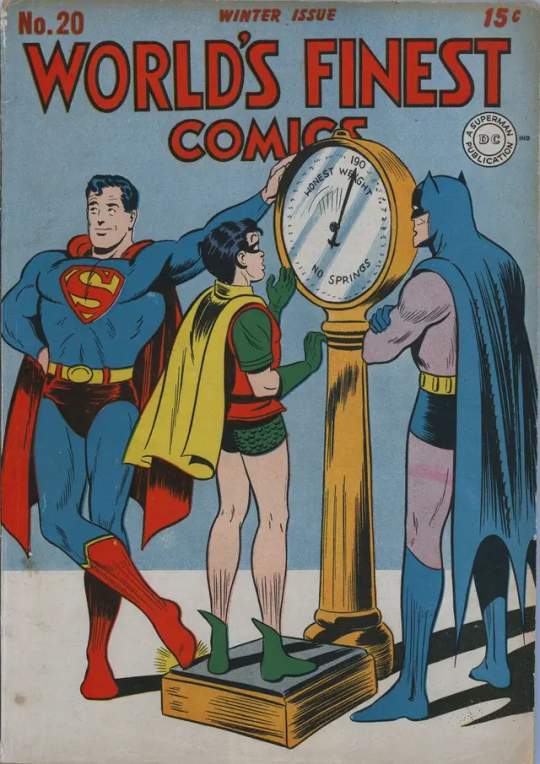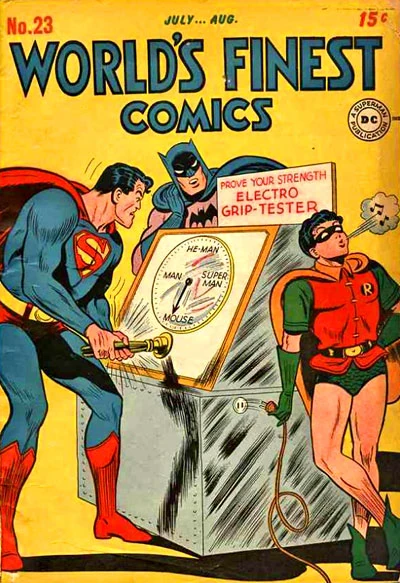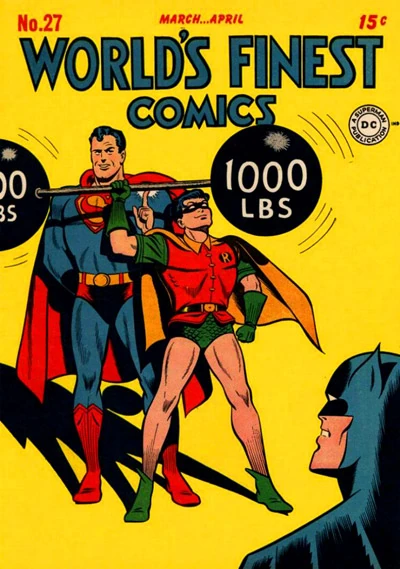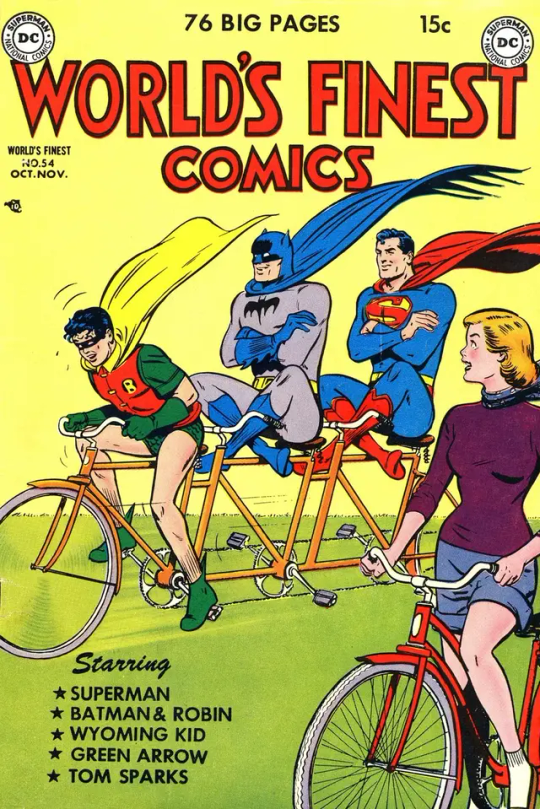#Charles Paris
Explore tagged Tumblr posts
Text




Cover artists: Jack Burnley - #20, 23 & 27 (both with Charles Paris); Win Mortimer - #54.
I love these early World's Finest Comics covers with Superman and Robin messing with each other (sometimes with an assist from Batman).
This was the period before Superman and Batman and Robin actually teamed-up inside the book, which was an anthology title, but they shared every single cover. The covers usually showed the three pals having fun playing baseball, or basketball, skiing, going to the swimming hole, or other activities boys liked to do.
Inside Superman and Batman (with Robin) had solo stories, along with whatever other characters were featured.
It wasn't until Superman (vol. 1 ) #76 (May, 1952) that Superman and Batman actually met in a comic book story, and accidentally learned each other's secret identity at the same time.
And they wouldn't begin teaming-up in World's Finest Comics for another two years, in #71 (July-August, 1954). As a cost saving measure, the book's page count was cut, along with the anthology format. The editors decided to put their most popular characters together in the one story there was room for, and a tradition was born. The Superman-Batman team-ups would, except for a short period around issue #200, be the format of the book until it was cancelled in 1986 with issue #323.
#World's Finest Comics#Superman#Batman#Robin#DC Comics#Golden Age comics#Jack Burnley#Charles Paris#Win Mortimer.
411 notes
·
View notes
Text

“The Claws of the Catwoman”
Bob Kane - Charles Paris
15 notes
·
View notes
Photo

(via House of Mystery #1 - 1st issue - Pencil Ink)
Cover by Win Mortimer and Charles Paris.
15 notes
·
View notes
Text

September 1954. DETECTIVE COMICS #211 was Catwoman's last appearance until 1966, which she celebrated by throwing Batman over a waterfall (though not without secretly leaving him the means to free himself). She got away at the end, too.
#comics#detective comics#edmond hamilton#dick sprang#charles paris#batman#bruce wayne#catwoman#selina kyle#batcat#golden age batman#batromance
25 notes
·
View notes
Text

Sheldon Moldoff (as Bob Kane) and Charles Paris "Mystery Gadget from the Stars" Batman #151 Robin title splash (1962) Source
Colorist uncredited (and penciller, too)

5 notes
·
View notes
Text

Frankenstein Friday: It doesn't get much better than this. In the May, 1948 issue of Detective Comics, in a story called "The True Story of Frankenstein," by Bob Kane and Charles Paris, Frankenstein meets Batman and Robin. It's a time-travel plot-device story, and really all very amiable and silly, but still: Batman and Robin and the Frankenstein Monster in the same panel! What 11-year-old boy in 1948 didn't want to see that?
12 notes
·
View notes
Text

World's Finest Comics #30 (DC, 1947) Jack Burnley and Charles Paris cover. - source Heritage Auctions
10 notes
·
View notes
Text
Ngl, it is pretty funny that lately my mystery listens are Paul Temple and Charles Paris, because it's like this:
Paul Temple: writes mystery novels. Has a good sleeping and a good writing schedule. Doesn't experience writer's block. He's married to another writer and they are a very loving, mutually supportive, drama free couple. Sometimes they get to investigate murders together. This is a drama series.
Charles Paris: alcoholic actor. Every time he gets a job, someone dies. Estranged from his wife for years because of his alcohol and cheating problem. Tries several times to quit being a stupid cheater, with different degrees of success. He gets injured often. His daughter Juliet is a mess in a complete different way and a headache inducing worry for both him and his wife. This is a comedy series.
4 notes
·
View notes
Text


Brave And The Bold: Metal Men (1964/1966)
Art by Ramon Fradon / Ramona Fradon And Charles Paris
#Comics#DC Comics#Brave And The Bold#Metal Men#Metamorpho#Atom#Vintage#Art#DC#CGC#Ramona Fradon#Charles Paris#1964#1966#1960s#60s
22 notes
·
View notes
Text

9 notes
·
View notes
Text




Charles Daubigny (1817–1878) - Gibet de Montfaucon
illustration from Victor Hugo's novel ‘Notre-Dame de Paris’, édition Perrotin, 1844
engraved by Adèle Laisné
source
#charles daubigny#adèle laisné#gibet de montfaucon#victor hugo#notre dame de paris#the hunchback of notre dame#19th century art#19th century#gallows#hanged man#skulls#gothic#dark art#art#book illustration#illustration#engraving
2K notes
·
View notes
Photo
April 1960. Afflicted with temporary amnesia, Ace the Bathound flees Batman and Robin and wanders into the woods, where he befriends an old hermit who is unusually respectful of dog privacy.
[Image ID: Cropped comics panel from BATMAN #131 (April 1960), scripted by Bill Finger with pencils by Sheldon Moldoff and inks by Charles Paris, showing old Wilkins the hermit, a middle-aged white man with white hair and a white beard, talking to Ace the Bathound, saying, "Why would you be wearing that mask? Well--t'ain't none o' my business! I respect privacy! That's why I live here--away from snoopy folks! Lived here for 10 years--alone--and glad of it!" Ace looks up at him eagerly. In the background is a pine forest.]

Batman #131 - “The Dog that Betrayed Batman” (1960)
written by Bill Finger art by Sheldon Moldoff & Charles Paris
107 notes
·
View notes
Text
The way he mimics everyone and messes with Loki is so funny 😭

604 notes
·
View notes
Text

Just two mutants in love growing old somewhere in Paris
(They finally got their rings)
I'm currently obsessed with those tiny freckles of him, soooo… here you are ✨And I���m sorry for being a bit slow this days, I have a lot of assignments to do in Uni😅
#cherik#old man yaoi#i mean real old men yaoi#finally#x men fanart#x men movies#x men#erik x charles#erik lensherr x charles xavier#charles x erik#charles xavier#erik lehnsherr#max eisenhardt#fanart#procreate#artists on tumblr#paris proposal
444 notes
·
View notes
Text

"The Origin of Killer Moth!" from BATMAN #63 (February/March 1951), written by Bill Finger with art by Lew Sayre Schwartz and Charles Paris (signed as Bob Kane).
6 notes
·
View notes
Text


Sheldon Moldoff and Charles Paris - Batman #157 (1963)
5 notes
·
View notes